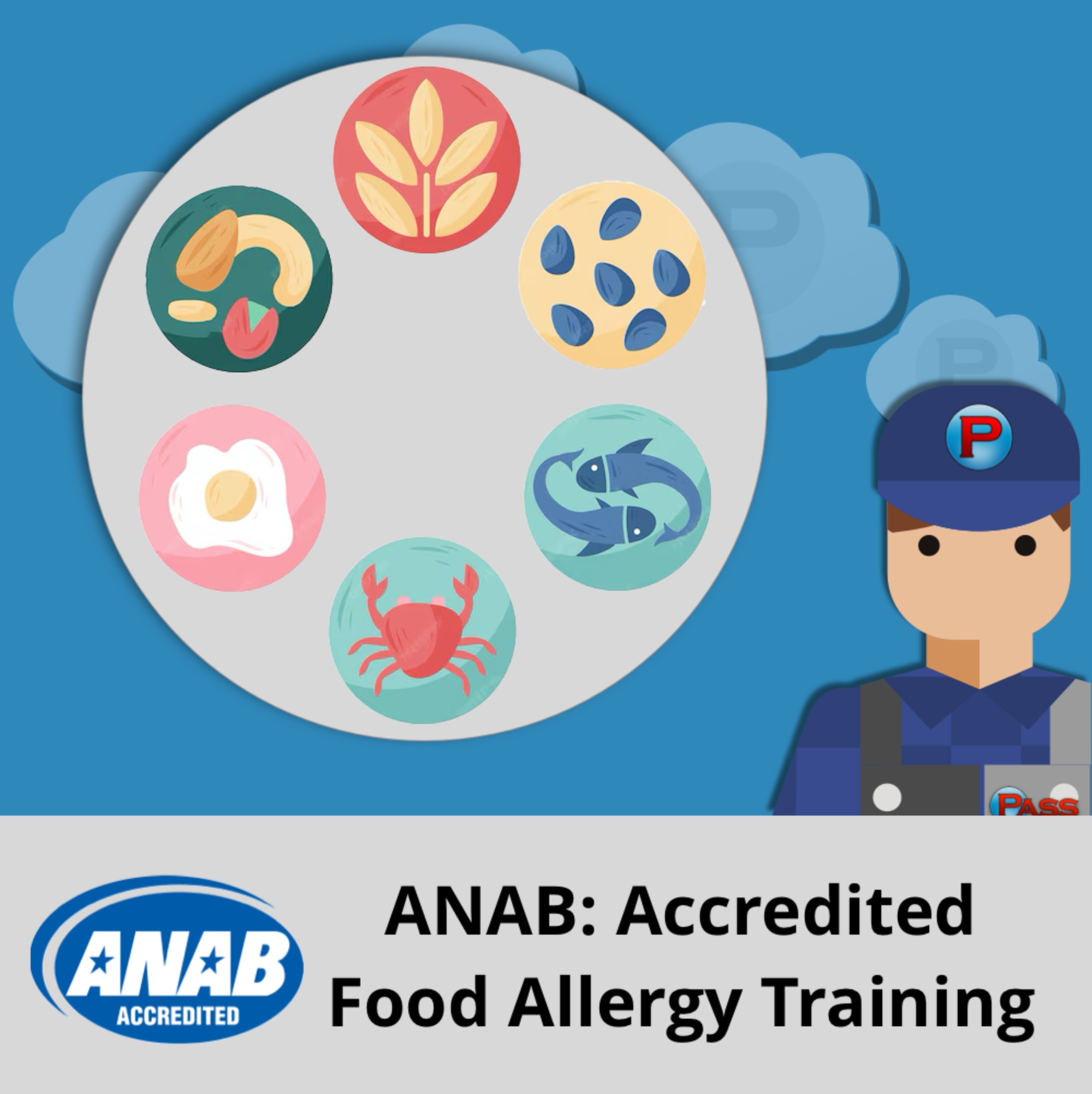The PASS Training Marketplace
ANAB: Accredited Food Allergy Training
ANAB: Accredited Food Allergy Training
Product Description
ANAB: Accredited Food Allergy Training
Accredited food allergy training programs are essential for ensuring the safety and well-being of individuals with food allergies. These programs educate food service professionals, caregivers, and educators about identifying, managing, and preventing food allergy reactions. The training typically covers a range of topics, including understanding food allergies, recognizing symptoms of allergic reactions, and implementing effective emergency response procedures. By completing accredited training, participants gain the knowledge and skills necessary to create safer environments for those with food allergies.
Accredited food allergy training programs are essential for ensuring the safety and well-being of individuals with food allergies. These programs educate food service professionals, caregivers, and educators about identifying, managing, and preventing food allergy reactions. The training typically covers a range of topics, including understanding food allergies, recognizing symptoms of allergic reactions, and implementing effective emergency response procedures. By completing accredited training, participants gain the knowledge and skills necessary to create safer environments for those with food allergies.
One key component of accredited food allergy training is the emphasis on cross-contact prevention. Cross-contact occurs when allergens are unintentionally transferred from one food to another, posing a significant risk to individuals with severe allergies. Training programs teach participants how to properly clean and sanitize surfaces, utensils, and equipment to prevent cross-contact. Additionally, they learn about proper food labeling and storage practices to ensure that allergen-containing foods are identified and kept separate from allergen-free foods.
Accredited food allergy training also includes practical, hands-on exercises and assessments to reinforce learning. Participants may engage in role-playing scenarios to practice responding to allergic reactions, including administering epinephrine auto-injectors. These interactive elements help build confidence and competence in managing real-life situations. Upon successfully completing the training, participants receive certification, which enhances their professional credentials and demonstrates their commitment to maintaining a safe and inclusive environment for individuals with food allergies.
About this Course
Become familiar with food allergies and intolerances with the information in our training course. Our ANAB-Accredited food allergy course covers the top 9 food allergens and is designed to help anyone in the food service industry prevent customers from allergic reactions.
Specifically, you’ll learn the differences between food allergies and food intolerances, the roles of everyone in a restaurant in preventing food allergies, how to safely prepare food for those with allergies, and how to identify symptoms of an allergic reaction.
Once you complete the lessons, you must score at least 80% on the final exam to pass and earn your certificate.
Topics Covered
Topics Covered
- Introduction and Overview
- Food Allergies Occur in Multiple Settings
- Food Service: Restaurants and Bars
- Educational Settings: Schools and Early Childhood Education (ECE) Programs
What You’ll Learn
- Define food allergy and list the top 9 food allergens
- Recognize the difference between a food allergy and food intolerance
- Identify symptoms of a food allergic reaction and describe how to prevent potentially fatal anaphylaxis through the use of epinephrine
- Describe the protocol for notifying emergency responders if a food allergic reaction occurs
- Recognize the different needs that the hospitality industry, nursing homes, and gyms, and activity venues have when it comes to dealing with food allergies
- Explain how to best manage food allergens in a food service setting such as a restaurant or bar
- Discuss the best practices for serving a customer with a food allergy, including the role of management and front and back of the house employees
- Describe how to properly prepare an allergen-safe meal for a customer with a food allergy
- Discuss the prevalence of food allergies in children and the importance of preventing allergic reactions in school settings
- Explain how the signs of an allergic reaction differ between children and adults
- Educate children and parents about how the entire school community can support each other in preventing allergic reactions
- Respond properly to a child having an allergic reaction
- Final Exam
- Yes
- Final Exam Passing Score
- 80%
- Certificate
- No
- Average Rating
- / 0 Reviews
Introduction and Overview Chapter 1
The ANAB-accredited food allergen training equips food service professionals with essential knowledge to manage food allergens, covering the top nine allergens and teaching practical skills to prevent cross-contact and respond to allergic reactions. Upon completion, participants receive a recognized certificate, enhancing food safety in their establishments.
Food Allergies Occur in Multiple settings Chapter 2
Food allergies can occur in various settings, including homes, schools, restaurants, and workplaces, posing significant health risks if allergens are not properly managed. Effective communication and strict adherence to food safety protocols are essential to prevent allergic reactions and ensure the safety of individuals with food allergies.
Food Service: Restaurants and Bars Chapter 3
Food service in restaurants and bars involves preparing and serving food and beverages to customers, ensuring high standards of quality, hygiene, and customer satisfaction. Staff must be skilled in food safety practices, efficient service, and effective communication to create a positive dining experience.
Educational Settings: Schools and Early Childhood Education (ECE) Programs Chapter 4
Food allergens in educational settings, such as schools and universities, require careful management to protect students with allergies. Implementing strict food safety protocols and ensuring effective communication among staff, students, and parents are crucial to prevent allergic reactions and maintain a safe learning environment.

